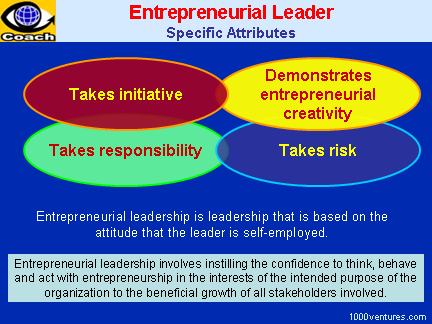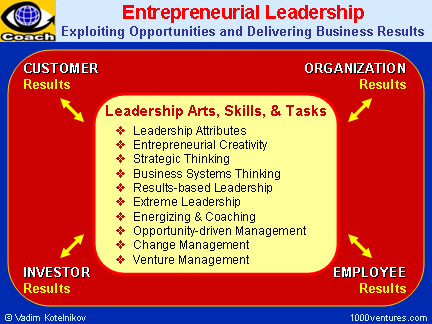|
Contents
1. Why Entrepreneurial
Leadership?
Rapidly Changing Global Scenario
Knowledge-based Enterprise versus Industrial Enterprise
Entrepreneurial Organization: Challenges, Opportunities, and
Strategies
Entrepreneurial Organization: 10 Characteristics and 5 Benefits
Entrepreneurial Leadership: Building Attributes and Delivering
Results
2. What Entrepreneurial Leaders Do
Leader as an Entrepreneur: Ten Key Action Roles
Leadership-Management Synergy
Strategic Leadership: Generic Role and Main Functions
Results-based Leadership
The Four E's of Leadership
Why Change Fails
The Eight Stage Change Process
Making Big Changes: Ten Questions to Answer
3. Entrepreneurial Leadership Attributes
Leader as an Entrepreneur: Talent, Temperament, and Technique
Synergy
Entrepreneurial Leaders: Specific Attributes
Entrepreneurial Creativity
Be Different and Make a Difference
Creative Problem Solving: Turning
Problems Into Opportunities
Cross-functional Excellence
4. Inspiring, Energizing,
and Empowering Employees
The Tao of
Employee Empowerment
Lessons
from Jack Welch: Energize Others
10 Roles of Inspirational Leaders
Freedom To Fail
Building a Team Culture
Ten Steps To Develop Entrepreneurial Staff
5. Opportunity-driven Business Development
Lessons from Jack Welch: See
Change as an Opportunity
Strategy Pyramid vs. Strategy Stretch
Choosing Between Strategy and Opportunity Approach
Corporate Management vs. Venture Management
Strategic Achievement
Organizing Rapid Opportunity Search
Fast Company
Fast Decision Making: Establishing
Corporate Guiding Principles
6.
Leading Innovation
Create a Culture of Questioning
Radical Innovation
The Jazz
of Innovation: 11 Practice Tips
Loose-Tight Leadership
Tips for Making the Vision a Reality |

Entrepreneurial
Leadership Defined
In the increasingly turbulent and
competitive environment business firms face today, a new type of
"entrepreneurial" leader distinct from other behavioral forms of
managerial leadership is required. Entrepreneurial leadership is
leadership that is based on the attitude that the leader is
self-employed. Leaders of this type:
-
take initiative and act as if they
are playing a critical role in the organization rather than a
mostly important one and energize their people,
-
demonstrate entrepreneurial
creativity, search continuously for new opportunities and pursue
them,
-
take risk, venture into new areas
and provide strategic direction and inspiration to their people,
-
take responsibility for the
failures of their team, learn from these failures and use them
as a step to ultimate success and strategic achievement.
Entrepreneurial leadership involves
instilling the confidence to think, behave and act with
entrepreneurship in the interests of fully realizing the intended
purpose of the organization to the beneficial growth of all
stakeholders involved.
Key Benefits
In the new era of rapid changes and
knowledge-based enterprises, managerial work becomes increasingly a
leadership task. Leadership is the primary force behind successful
change. Leaders empower employees to act on the vision. They execute
through inspiration and develop implementation capacity networks
through a complex web of aligned relationships.
Entrepreneurial leadership is not a
position, it is a process. The entrepreneurial leader takes
responsibility to assist the organization in creating such
conditions so that, instead of being controlled, the organization
generates its own order and responds creatively to the environment.
This role is not only more productive for the organization, it is
liberating for the leader as well. By helping to unleash the
creative potential of their organizations, entrepreneurial leaders
are unleashing their own.
... and
much, much more!
|

